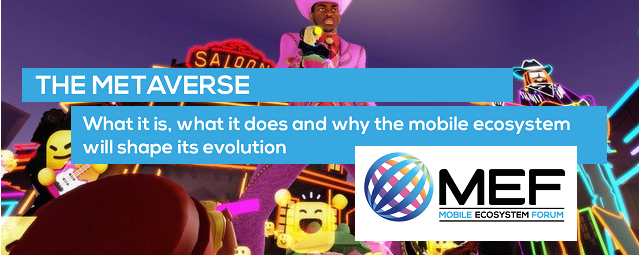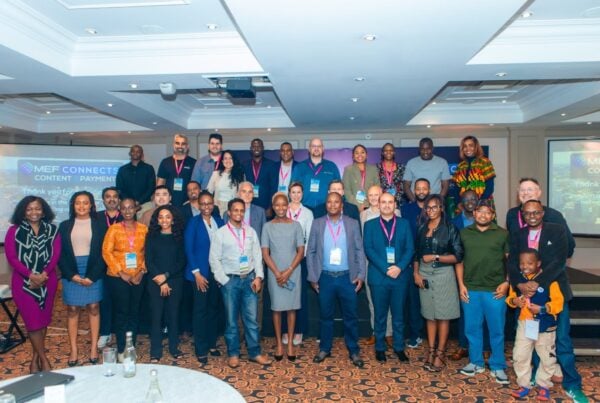Goldman Sachs says the Metaverse economy could eventually be worth $8 trillion. No wonder, everyone in tech is talking about this new ‘UX layer for the Internet”. Last month, MEF hosted a webinar on the topic….
Is the Metaverse here yet? Or is the Metaverse still under construction, waiting for the necessary advances in network architecture and holographic hardware.
The answer, of course, is that there is no answer. And there won’t be, until we have a definition of the Metaverse that we can all agree on.
But for now, lots of interesting stuff is happening. Take Roblox. Is it a Metaverse or is it just a video game? We can debate that. But the fact that Nike has opened a shop selling virtual sneakers inside Roblox suggests something new and significant is under way.
Watch the MEF Webinar in full
And what about Decentraland – a Metaverse based in blockchain technology? It sells virtual land to developers. In 2021, JPMorgan Chase bought a plot and opened its Onyx Lounge in the Decentraland Metajuku virtual mall.
These are just two developments among hundreds. Without doubt, the Metaverse is one of hottest topics in the tech world right now. And that includes the mobile community – any visitor to MWC22 would know. The Metaverse loomed large on the showfloor and the conference programme.
MEF is well aware of this. In fact, we will be publishing a report on the topic later this month.
In advance of its publication, we convened a webinar to dive into the topic, and to address questions such as:
If the Metaverse is going to deliver immersive and persistent experiences to millions of people, it is going to need next generation network architecture. Doug Makishima believes moving processing from the device to the cloud, and the cloud closer to the user, will be essential for this.”
- How do we define the Metaverse?
- Is it the next iteration of the internet?
- What technical advances will be needed to trigger the expansion of the metaverse?
- How will people make payments in virtual worlds?
- What are the key questions around metaverse identity?
- How might the metaverse change commerce?
- What will be the role of messaging in new virtual worlds?
The webinar featured two MEF members that have been thinking particularly hard about the Metaverse:
- Doug Makishima, chief sales and marketing officer, Summit Tech
- Ivan Ostojić, chief business officer, Infobip
Here is a snapshot of the discussion…
Definitions
The panellists agreed that defining the Metaverse at this early embryonic stage is not easy. However, Ostojić outlined that it helps to think about it in three ways – as a product or service, as a place and as a moment.
He described the first as: “a network of persistent real-time rendered 3D worlds and simulations that can be experienced synchronously by an unlimited number of users each with an indivisible sense of presence.”
It’s quite a complex description. Happily, Ostojić says defining the Metaverse as a place is more straightforward – as a destination where you can go to play video games or go shopping.
As for Metaverse as “moment”, well, it’s a little more conceptual. “This is really about user experience,” said Ostojić. “It’s where our online experience will mix with our physical world to become something more meaningful…and it will gives us a different kind of experience than we might get from just reading text or looking at video.”
Technology
If the Metaverse is going to deliver immersive and persistent experiences to millions of people, it is going to need next generation network architecture. Doug Makishima believes moving processing from the device to the cloud, and the cloud closer to the user, will be essential for this. He says 5G has pontential here.
“The Metaverse will need a lot of compute power,” he said. “That means doing more in the cloud. 5G gives you the bandwidth and the low latency you need. But it also gives you multi-access edge computing (MEC), which moves computing power to the edge of the network. This helps tremendously to support the Metaverse’s real-time requirements and voracious appetite for compute power and storage.”
Identity
Identity is a tricky issue in today’s digital economy. Flaws in the identity and authentication process open the door to fraud. And when companies get ‘good’ at identity, they raise the spectre of surveillance and intrusion.
In the Metaverse, these issues will persist. In fact, said Ostojić, they will be complicated by new possibilities. “Your online identity will be expanded in the Metaverse,” he said. “There will be the potential to collect new biometric data such as how your eyes react to ads for example. This will raise privacy concerns. I think in principle we will need to develop some kind of digital passport to protect your data and allow you share your data only with who you want.”
The Metaverse economy
If we accept that the Metaverse is a new iteration of the internet – or at least a new UX layer on top of it – then it will change the way we shop, play, work and socialise. That will surely yield a huge new commercial opportunity.
Indeed, investment bank Goldman Sachs has predicted that the Metaverse economy could eventually be worth $8 trillion.
Makishima is similarly bullish. “Some say the Metaverse economy will be larger than the physical one,” he said. “I do believe it can transform business and society. We saw from the pandemic how technology can boost productivity. Huge sections of population learned new behaviours… remote (virtual) working, video conferencing, omnichannel messaging, chat bots, QR codes. All of this enabled businesses to stay productive. The Metaverse will take that one step further.”
Exploring the Metaverse – Download the free whitepaper
The Metaverse is a hot topic in tech circles right now. But for all the talk, the Metaverse remains a slippery concept to grasp. Whatever the definition, it is important to keep on top of developments. Why? Because without doubt, the Metaverse will eventually create business opportunities for all stakeholders in the mobile ecosystem. This report from MEF provides a window into this essential topic.







